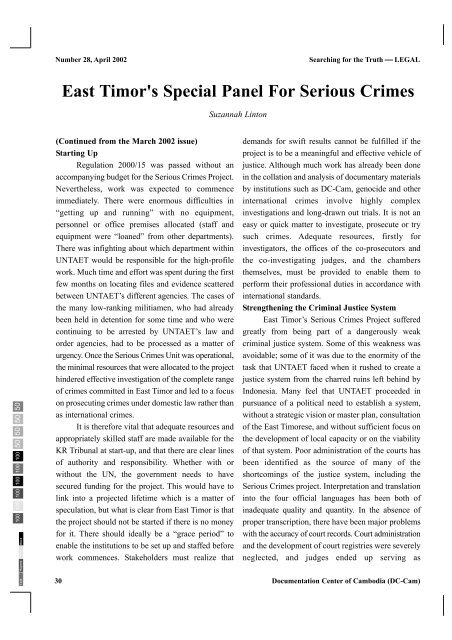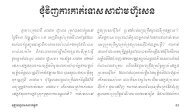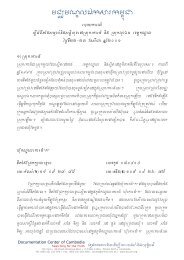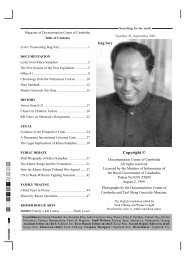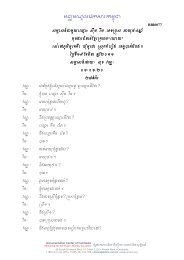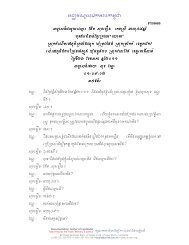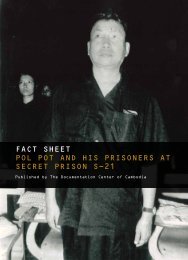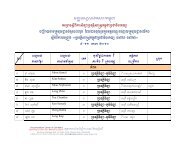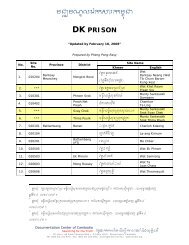Searching for the truth Issues 28 - Documentation Center of Cambodia
Searching for the truth Issues 28 - Documentation Center of Cambodia
Searching for the truth Issues 28 - Documentation Center of Cambodia
You also want an ePaper? Increase the reach of your titles
YUMPU automatically turns print PDFs into web optimized ePapers that Google loves.
100 100 100 100 100 100 50 50 50 50<br />
Black<br />
Yellow<br />
Magenta<br />
Cyan<br />
Number <strong>28</strong>, April 2002<br />
30<br />
<strong>Searching</strong> <strong>for</strong> <strong>the</strong> Truth ⎯ LEGAL<br />
East Timor's Special Panel For Serious Crimes<br />
(Continued from <strong>the</strong> March 2002 issue)<br />
Starting Up<br />
Regulation 2000/15 was passed without an<br />
accompanying budget <strong>for</strong> <strong>the</strong> Serious Crimes Project.<br />
Never<strong>the</strong>less, work was expected to commence<br />
immediately. There were enormous difficulties in<br />
“getting up and running” with no equipment,<br />
personnel or <strong>of</strong>fice premises allocated (staff and<br />
equipment were “loaned” from o<strong>the</strong>r departments).<br />
There was infighting about which department within<br />
UNTAET would be responsible <strong>for</strong> <strong>the</strong> high-pr<strong>of</strong>ile<br />
work. Much time and ef<strong>for</strong>t was spent during <strong>the</strong> first<br />
few months on locating files and evidence scattered<br />
between UNTAET’s different agencies. The cases <strong>of</strong><br />
<strong>the</strong> many low-ranking militiamen, who had already<br />
been held in detention <strong>for</strong> some time and who were<br />
continuing to be arrested by UNTAET’s law and<br />
order agencies, had to be processed as a matter <strong>of</strong><br />
urgency. Once <strong>the</strong> Serious Crimes Unit was operational,<br />
<strong>the</strong> minimal resources that were allocated to <strong>the</strong> project<br />
hindered effective investigation <strong>of</strong> <strong>the</strong> complete range<br />
<strong>of</strong> crimes committed in East Timor and led to a focus<br />
on prosecuting crimes under domestic law ra<strong>the</strong>r than<br />
as international crimes.<br />
It is <strong>the</strong>re<strong>for</strong>e vital that adequate resources and<br />
appropriately skilled staff are made available <strong>for</strong> <strong>the</strong><br />
KR Tribunal at start-up, and that <strong>the</strong>re are clear lines<br />
<strong>of</strong> authority and responsibility. Whe<strong>the</strong>r with or<br />
without <strong>the</strong> UN, <strong>the</strong> government needs to have<br />
secured funding <strong>for</strong> <strong>the</strong> project. This would have to<br />
link into a projected lifetime which is a matter <strong>of</strong><br />
speculation, but what is clear from East Timor is that<br />
<strong>the</strong> project should not be started if <strong>the</strong>re is no money<br />
<strong>for</strong> it. There should ideally be a “grace period” to<br />
enable <strong>the</strong> institutions to be set up and staffed be<strong>for</strong>e<br />
work commences. Stakeholders must realize that<br />
Suzannah Linton<br />
demands <strong>for</strong> swift results cannot be fulfilled if <strong>the</strong><br />
project is to be a meaningful and effective vehicle <strong>of</strong><br />
justice. Although much work has already been done<br />
in <strong>the</strong> collation and analysis <strong>of</strong> documentary materials<br />
by institutions such as DC-Cam, genocide and o<strong>the</strong>r<br />
international crimes involve highly complex<br />
investigations and long-drawn out trials. It is not an<br />
easy or quick matter to investigate, prosecute or try<br />
such crimes. Adequate resources, firstly <strong>for</strong><br />
investigators, <strong>the</strong> <strong>of</strong>fices <strong>of</strong> <strong>the</strong> co-prosecutors and<br />
<strong>the</strong> co-investigating judges, and <strong>the</strong> chambers<br />
<strong>the</strong>mselves, must be provided to enable <strong>the</strong>m to<br />
per<strong>for</strong>m <strong>the</strong>ir pr<strong>of</strong>essional duties in accordance with<br />
international standards.<br />
Streng<strong>the</strong>ning <strong>the</strong> Criminal Justice System<br />
East Timor’s Serious Crimes Project suffered<br />
greatly from being part <strong>of</strong> a dangerously weak<br />
criminal justice system. Some <strong>of</strong> this weakness was<br />
avoidable; some <strong>of</strong> it was due to <strong>the</strong> enormity <strong>of</strong> <strong>the</strong><br />
task that UNTAET faced when it rushed to create a<br />
justice system from <strong>the</strong> charred ruins left behind by<br />
Indonesia. Many feel that UNTAET proceeded in<br />
pursuance <strong>of</strong> a political need to establish a system,<br />
without a strategic vision or master plan, consultation<br />
<strong>of</strong> <strong>the</strong> East Timorese, and without sufficient focus on<br />
<strong>the</strong> development <strong>of</strong> local capacity or on <strong>the</strong> viability<br />
<strong>of</strong> that system. Poor administration <strong>of</strong> <strong>the</strong> courts has<br />
been identified as <strong>the</strong> source <strong>of</strong> many <strong>of</strong> <strong>the</strong><br />
shortcomings <strong>of</strong> <strong>the</strong> justice system, including <strong>the</strong><br />
Serious Crimes project. Interpretation and translation<br />
into <strong>the</strong> four <strong>of</strong>ficial languages has been both <strong>of</strong><br />
inadequate quality and quantity. In <strong>the</strong> absence <strong>of</strong><br />
proper transcription, <strong>the</strong>re have been major problems<br />
with <strong>the</strong> accuracy <strong>of</strong> court records. Court administration<br />
and <strong>the</strong> development <strong>of</strong> court registries were severely<br />
neglected, and judges ended up serving as<br />
<strong>Documentation</strong> <strong>Center</strong> <strong>of</strong> <strong>Cambodia</strong> (DC-Cam)


